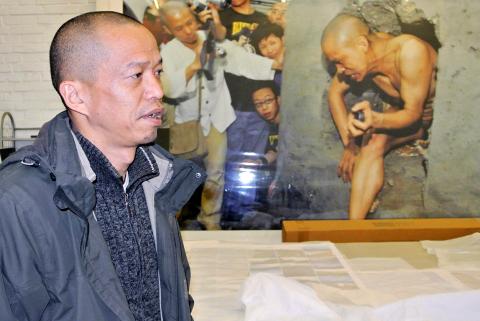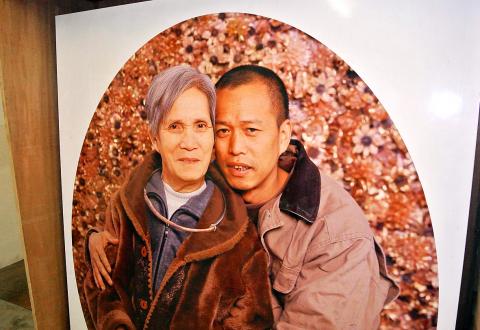Having one of his own ribs cut out to turn into a necklace, enduring a slashing from neck to thigh — He Yunchang (何雲昌) will do anything for art as long as it does not kill him.
The extreme performance artist’s head is almost entirely shaved and his face flecked with faint scars from his shows. His blood-drenched, often naked masochistic displays are intended to demonstrate that some things are worth making sacrifices for.
The 23cm rib he voluntarily had surgically removed as China celebrated the opening day of the Beijing Olympics — on the auspicious, once-in-a-century date of 8/8/08 — hangs around his neck on a golden loop, dragons’ heads biting down on either end.

Photo: AFP
The operation was intended to demonstrate his own individual autonomy, he said, a decision he could take for himself, “while many other things are out of my control.”
“There are more powerful people in society who make decisions for others, and there are rules and social morality which restrict people,” he said late one night in his studio on the outskirts of Beijing, in the raspy voice of a 120-cigarette-a-day smoker.
In one of his latest works in March, he painted the fingernails and toenails of 10 mannequins — with his own blood.

Photo: AFP
“I want to convey the message that I am ready to pay a high price to show my concern” about the world, said the 48-year-old, a married father of one.
“My principle is that if it’s worth the pain, then my safety comes second. But I keep things under control. It is important that I do not let myself die,” He said.
He’s photographs, paintings and sculptures have been exhibited and sold across Europe and the US. Their popularity derives from his drastic performances, often almost as excruciating for his audiences to watch as they are agonizing for him.
In a 2010 performance titled One Meter Democracy, He gathered 25 people for a poll on whether he should endure a knife gash — without anesthetic — from his collarbone to his knee.
The idea was approved by 12 to 10, with three abstentions, and a doctor carried out the incision in a procedure that lasted several minutes, with voters posing for a group photo afterward while He lay naked and bloodied on a bed.
The artist has also stared at panels of 10,000 glaring watts of light bulbs to damage his eyesight, encased himself in a cube of quicksetting concrete for 24 hours and burned his clothes while wearing them.
He once hung upside down from a crane for 90 minutes holding a knife in a rushing river, blood dripping from cuts in his arms made with the blade, in a symbolic mixing of the liquids.
Among his less extreme endeavors, he also carried a stone from a beach in England on a 112-day journey over 3,500km by foot — only to put the travel companion back where he found it.
“He Yunchang is an alchemist of pain,” said Judith Neilson, founder of the White Rabbit Gallery in Sydney, which specialises in contemporary Chinese art.
“He Yunchang evidently believes that pain and extreme discomfort, deliberately planned and willingly undergone, have a transcendent quality — and that it is this quality that raises mere action to the level of art,” she said.
His performances “serve as silent rebukes to contemporary Chinese society, where people undergo all kinds of suffering for money, precisely because they see money as the ultimate protection against suffering,” Neilson added.
Although contemporary art has flourished in China over recent years, the Chinese Communist Party maintains tight controls on freedom of expression and only a minority of artists convey political messages with their work.
He has avoided directly confronting the authorities and says: “I generally stay quiet and calm. I don’t make waves.”
However, China’s most renowned dissident artist, Ai Weiwei (艾未未), who has faced detention and strict surveillance for his more confrontational work, praises the approach of his friend and neighbor in Caochangdi, an avant-garde artists’ community on the outskirts of the capital.
He’s art “always has a mix of play, personal history, political message and poetic romance,” Ai said.
“Everything that is happening in China today, with development, old structures and communist doctrines, are all stuck together,” Ai added.
He’s work “is trying to pull life out of the ruins.” His performances are not always easy to carry out and he has run into trouble with officialdom — although in the US, rather than in China.
In 2005 police thwarted his attempt to stand naked on a rock atop Niagara Falls for 24 hours.
Two years later officers in New York stopped him as he organized a game of mahjong — again naked — using bricks in place of the usual domino-sized tiles.
Several hospitals refused to carry out the rib removal without a medical justification, until he found a willing doctor in his home province of Yunnan in southwest China.
“This has been my wish for many years,” He recalled telling surgeons. “If you can help me realize it, then you’re actually helping me, not harming me.”

Kehinde Sanni spends his days smoothing out dents and repainting scratched bumpers in a modest autobody shop in Lagos. He has never left Nigeria, yet he speaks glowingly of Burkina Faso military leader Ibrahim Traore. “Nigeria needs someone like Ibrahim Traore of Burkina Faso. He is doing well for his country,” Sanni said. His admiration is shaped by a steady stream of viral videos, memes and social media posts — many misleading or outright false — portraying Traore as a fearless reformer who defied Western powers and reclaimed his country’s dignity. The Burkinabe strongman swept into power following a coup in September 2022

‘FRAGMENTING’: British politics have for a long time been dominated by the Labor Party and the Tories, but polls suggest that Reform now poses a significant challenge Hard-right upstarts Reform UK snatched a parliamentary seat from British Prime Minister Keir Starmer’s Labor Party yesterday in local elections that dealt a blow to the UK’s two establishment parties. Reform, led by anti-immigrant firebrand Nigel Farage, won the by-election in Runcorn and Helsby in northwest England by just six votes, as it picked up gains in other localities, including one mayoralty. The group’s strong showing continues momentum it built up at last year’s general election and appears to confirm a trend that the UK is entering an era of multi-party politics. “For the movement, for the party it’s a very, very big

ENTERTAINMENT: Rio officials have a history of organizing massive concerts on Copacabana Beach, with Madonna’s show drawing about 1.6 million fans last year Lady Gaga on Saturday night gave a free concert in front of 2 million fans who poured onto Copacabana Beach in Rio de Janeiro for the biggest show of her career. “Tonight, we’re making history... Thank you for making history with me,” Lady Gaga told a screaming crowd. The Mother Monster, as she is known, started the show at about 10:10pm local time with her 2011 song Bloody Mary. Cries of joy rose from the tightly packed fans who sang and danced shoulder-to-shoulder on the vast stretch of sand. Concert organizers said 2.1 million people attended the show. Lady Gaga

SUPPORT: The Australian prime minister promised to back Kyiv against Russia’s invasion, saying: ‘That’s my government’s position. It was yesterday. It still is’ Left-leaning Australian Prime Minister Anthony Albanese yesterday basked in his landslide election win, promising a “disciplined, orderly” government to confront cost-of-living pain and tariff turmoil. People clapped as the 62-year-old and his fiancee, Jodie Haydon, who visited his old inner Sydney haunt, Cafe Italia, surrounded by a crowd of jostling photographers and journalists. Albanese’s Labor Party is on course to win at least 83 seats in the 150-member parliament, partial results showed. Opposition leader Peter Dutton’s conservative Liberal-National coalition had just 38 seats, and other parties 12. Another 17 seats were still in doubt. “We will be a disciplined, orderly